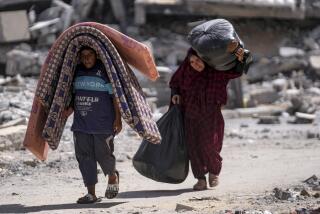26 Russian Hostages Released Amid Talks
- Share via
BESLAN, Russia — Sporadic gunfire rang out Thursday from a school where armed militants held hundreds of children and teachers hostage, but the attackers released 26 women and children and Russian officials conducted their first face-to-face negotiations with the guerrillas in an attempt to end the crisis.
As thousands of family members milled in tense uncertainty outside the cordon around the North Ossetia middle school, there were fears that the two-day standoff would end in violence. More than two dozen attackers, who have mined the school with explosives and strapped bomb belts to their waists, have vowed to blow up the school if attacked.
One freed hostage, Zalina Dzandarova, 27, said there were not 354 hostages, as Russian officials had estimated, but more than 1,000 crowded in the school gym in stifling heat with no water and little food. Dzandarova said that two female guerrillas blew themselves up Wednesday and that 10 men had been taken out of the gym and shot.
Lev Dzugayev, an aide to the president of North Ossetia, said authorities had seen seven bodies in the courtyard outside the school, all males believed to have been killed during the initial seizure. Some of the corpses had been thrown out of windows, he said.
A senior Russian security official said authorities were faced with a dilemma even worse than the 2002 seizure of the Dubrovka Theater in Moscow by Chechen militants. The siege led to the death of 129 hostages and 41 guerrillas when Russian troops pumped anesthesia-like gas into the theater before storming in.
“The situation is much worse than Dubrovka. Believe me, much worse,” said the official, who spoke on condition of anonymity. “It seems almost certain that the hostage-takers are not really interested in negotiations or any demands. So far, we haven’t gotten any coherent statement of what they really want.
“They are just biding their time, as if waiting for us to start storming this school, and then they will blow everything up. I think they are ready to blow themselves up, together with the hostages, in any case. It seems to be their one and only plan.”
The militants are believed to be linked to guerrillas in the separatist republic of Chechnya or possibly its neighbor, Ingushetia, into which Russia’s war in Chechnya has spilled over the last year or two. One of the militants’ key demands is reportedly the release of Ingush militants rounded up after a major guerrilla attack there in June that targeted Ingush government officials and police.
The militants are being held in a prison near Beslan in North Ossetia.
In a poll of its listeners Thursday, the Echo of Moscow radio station found that 64% would support Russian President Vladimir V. Putin in “any actions” needed to end the school siege.
But the head of the powerful Federal Security Service in North Ossetia, Valery Andreyev, told journalists that Russia remained committed to a negotiated end to the crisis.
“There is no question at the moment of opting for force,” he said. “There will be a lengthy and tense process of negotiation.”
In Moscow, Putin emphasized that Russia’s main task would be “to save the life and the health of those who have ended up as hostages. All the actions of our forces will be devoted to solving the talks.”
The Russian president said the current situation was “horrifying,” not only because children were involved but also because of the potential for religious and ethnic strife in the turbulent Caucasus region.
The decision to release some women and young children followed the arrival of a negotiator, Ruslan S. Aushev, a former president of Ingushetia who has long urged the Kremlin to talk to Chechen rebels. Aushev was the first negotiator to venture into the school, although well-known Moscow pediatrician Leonid Roshal, who played a high-profile role in the Dubrovka crisis, spoke to the attackers by telephone Wednesday and on Thursday morning.
“Ruslan Aushev had direct, personal contact with the hostages and their captors. He was at the gym, he saw the situation there,” Dzugayev said. “Contacts still continue, and the efforts now are directed toward supporting the hostages remaining at the gym.” He said authorities were focusing on persuading the guerrillas to allow the delivery of food and drink.
“The main objective is to have all the hostages freed as soon as possible,” Dzugayev added.
A parade of ambulances drove into Beslan Hospital about 5 p.m. carrying the 26 released hostages, many of whom were later allowed to go home. Russian television showed police in camouflage gear and sporting tattoos carrying babies out of the school, grinning and cradling them in their big arms.
Valery Tuayev, an ambulance driver, said he picked up four mothers and four toddlers at a location about 150 yards from the school. “The military and police had moved them away from the fighters,” he said.
On the ride to the hospital, he said, “they didn’t say anything. They just sat quietly. The kids were crying, and then they all calmed down when they were given some clear water and some cookies.”
The atmosphere at the command center around the cordoned-off facility was tense throughout the day as weapons fire and explosions rang out periodically from the school compound, including a rocket-propelled grenade that sailed out over nearby apartment buildings.
Some of the hostage-takers’ fire appeared to be aimed at photographers who ventured too close to the school.
More to Read
Sign up for Essential California
The most important California stories and recommendations in your inbox every morning.
You may occasionally receive promotional content from the Los Angeles Times.










